STORY: Stefanie Robinson
Josh Casey, our grand prize-winning author from the winter 2008-09 cycle of miniStories, offers a brand-new story about all manner of unrequited love -- it's poignant and a bit creepy, surprisingly wry, and altogether satisfying.





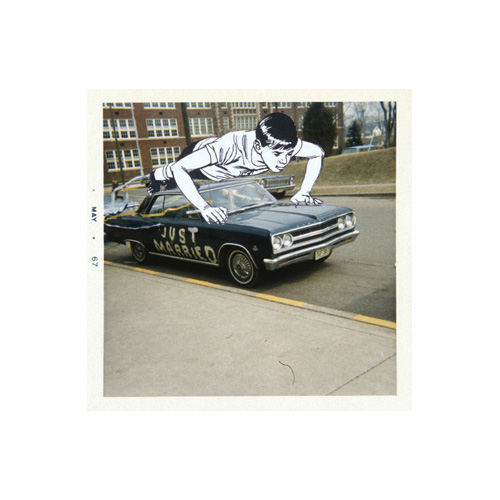
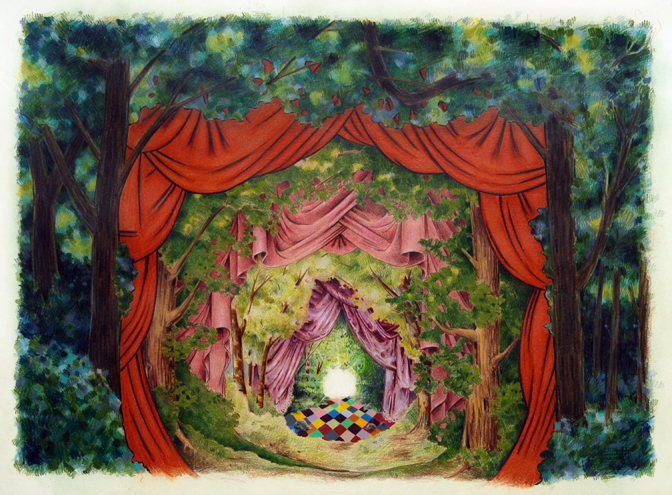
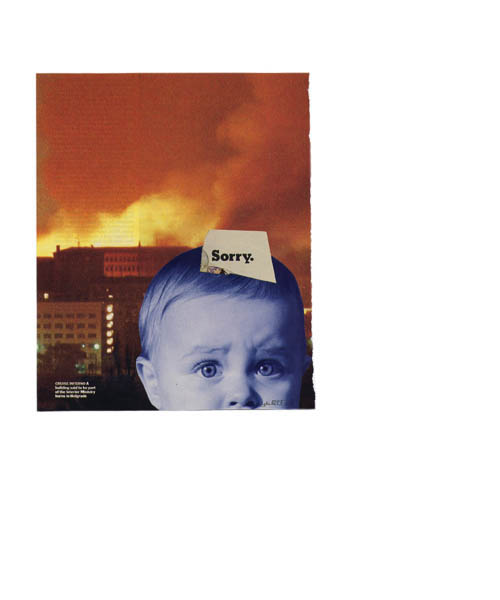
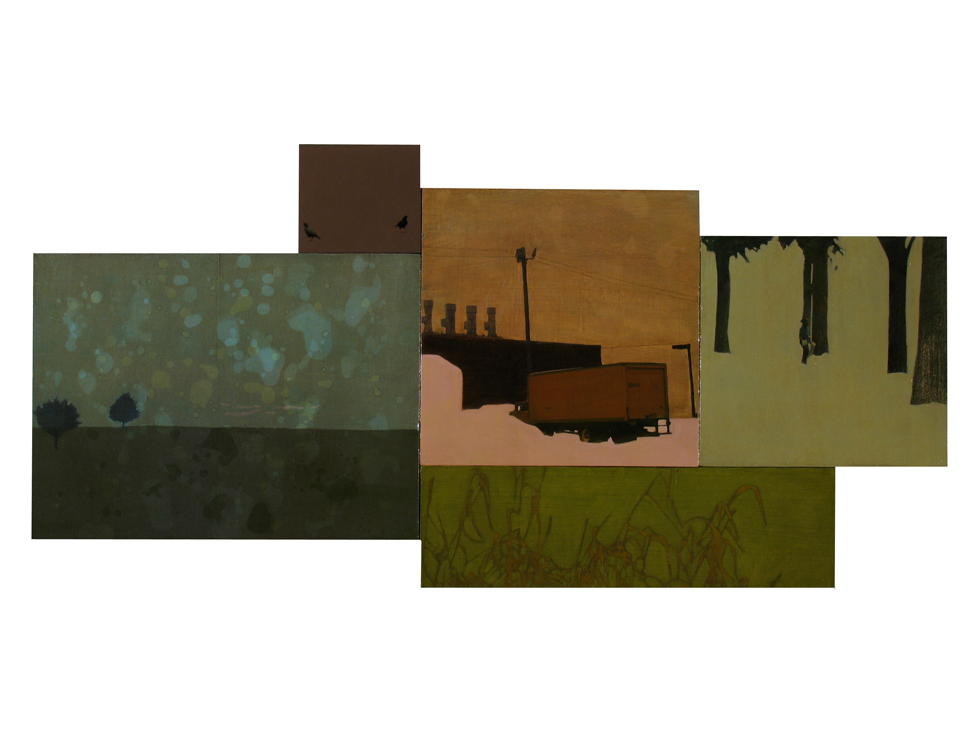
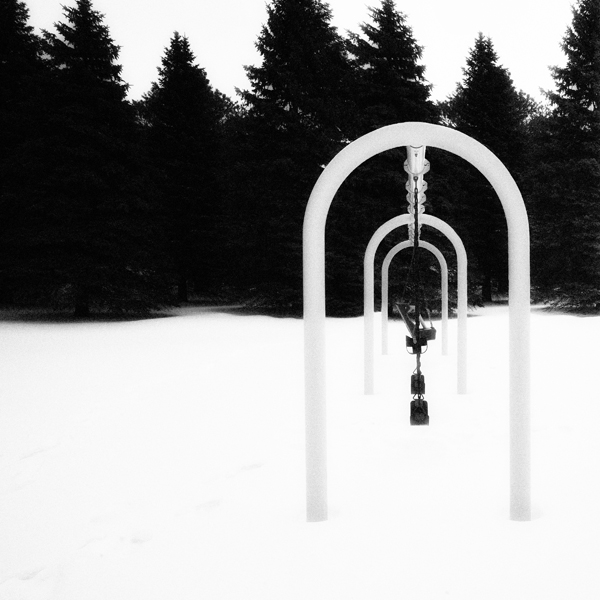

–To Abdi Zafar. Thanks for the lift.
YOU ARE STUCK. You are high up in your father’s tree again, in front of his house, in the dark, watching his lit rooms like a stage play. You are thirty-nine and a librarian and you are whispering your memories of Stefanie Robinson to the branches that hold you. Your father is sitting in his den, dialing his phone. He is behind a desk, holding a cordless, scratching his back. It is late. You are drunk on restaurant wine, wearing your darkest Levis and corduroy Date Blazer; the man you call your father is wearing sleep pants and a Vikings sweatshirt and, upstairs in her white robe, your father’s new wife has just fallen asleep.
“How did it go?” your father wants to know, because you’ve met someone. You ran into her while drinking your coffee at a big, dumb Starbucks somewhere. Literally, you bumped into her, killing the front of her blouse with your latte and, despite all of this, she agreed to let you take her out, for old time’s sake. “Didn’t it go okay?” your father asks, breaking his okay into the syllables. You think maybe he’s worried about you. Sitting alone in his tree with the cuff of your coat hung up in the bark somewhere, you think maybe he is right to be.
“REMEMBER STEFANIE ROBINSON?” you ask your father. “Remember her?” You are surprised at how the name sounds when you say it out loud. Like she is a new type of swear. Earlier tonight, at the Macaroni Grill in Fridley, watching the woman whose blouse you ruined at Starbucks stab baked ziti onto a fork, all you could think was Stefanie Robinson, Stefanie Robinson, Stefanie Robinson. And now look where you are.
Your father shakes his head. You can see he’s saying no, he doesn’t remember. And so you tell him that you’re in Stefanie Robinson’s apartment now. You are lying on her bed, you say, wearing only the smallest parts of your clothing, and Stefanie Robinson is in the bathroom, fitting her diaphragm.
Your father laughs at this. The light in the room catches on his face and you think maybe he sees you; he’s searching out your shape from his window and, for a moment, you try not breathing. You tell your father you don’t have much time, that Stefanie Robinson is putting some music on. She’s decided to take a shower first, you say, and your father gets upset.
“She’s taking a shower?” he says. “With the birth control inside of her? Won’t that ruin the medicine?” Your father is an idiot. He asks if you’re ready for babies, tells you he‘s not ready for grandbabies, but you don’t answer him. You try your cuff again; you’re afraid that to get down from the tree, you might have to tear it loose. You might have to fall. “I don’t have a lot of time,” you say to your father. “Stefanie Robinson is coming. So we have to hurry.”
But your father wants you to jog his memory. “Tell me who she is again?” he asks. The way he says her name, it sounds made-up. His lips don’t fit right around your thoughts of her. From where you’re sitting, your father looks like he could be saying something else. His mouth is out-of-sync with what’s coming into your ear. You’ve seen this sort of thing on TV. You have TV and you watch it a lot, so you would know. You tell yourself that this is the fault of dubbing, a problem of delay. TVs and telephones are the same to you — just wires and satellites bridging the big gaps between things — so why not here, in front of your father’s house in the dead of winter?
______________________________________________________
You’re afraid that to get out of the tree, you might have to fall.
______________________________________________________
“Tell me about Stefanie Robinson,” your father says again, leaving his den. You lose him for a moment behind a wall, as he’s climbing the stairs toward his kitchen. A week ago, your father came after you with a baseball bat. You’d gotten down from his tree quickly then. You’d made it into his bushes. “I know you’re there!” he’d said, swinging for the leaves, scraping down on the bark. “I know you’re watching!”
YOU REMEMBER that in kindergarten you were given a laminated nametag made of blue construction paper. Who you were was printed plainly then, in permanent magic marker. At recess, your teacher made you wear yours like a crown, bending your name into a circle and fitting a staple to the space where the ends met. This way, she said, it was easier for her to see you in the distance, at the far edges of the playground, where you were always sitting in the taller grasses, playing away from everyone else.
This is where you first met Stefanie Robinson, where you first picked up the thread of her. You were hanging upside down from that chain-link fence that separated you from the world — listening, with your insides rushing for your head, at the sounds the other children made. It was cold. Your nose was running infection, and your hat had fallen off; to you, the other kids sounded like birds, unforgiving wildlife that bit and flew. That is when you spotted the second nametag, the one just like yours, only with a different name on it: Stefanie Robinson. You looked all around for the rest of her. You searched for hints of Stefanie Robinson in the metal honeycomb of the jungle-gym and in the stains of fingerprints wrapped around the monkey-bars. When you couldn’t turn her up, you lifted what you had of her and hid it deep inside your coat. And she stayed.
YOU REMEMBER that Stefanie Robinson’s best friend had the house right behind yours, that you used to spy them-Stefanie Robinson and What’s-Her-Name-through the cracks in your fence. You don’t remember the friend’s name, but you remember Stefanie Robinson. “Do you remember that fence?” you ask your father now. “Remember that house?” But your father sets the phone down. Maybe he doesn’t want to hear it. Your father is not much for looking back, and so he keeps moving around the kitchen. He takes milk out of the refrigerator; the way he pours it into a glass, squinting at the expiration date with that half-smile of his, you think he might remember after all. That he must. And as your father is picking up the phone again, pressing buttons, you try your coat but nothing gives. You are just as stuck as ever. “I’m still here,” you say, and your father apologizes. “You’d think I’d remember something like that,” he says. “Well, what did she look like?” You tell your father that her hair was black and that both of her eyes were green. That she had freckles and then dimples and then cheekbones and lips. She was tall, you remember, and then taller still.
“Won’t she hear us?” Your father wants to know if Stefanie Robinson is back in bed with you, listening to him talk. “I don’t want to ruin your chances,” he says. You tell him that Stefanie Robinson is in her kitchen now, frying bacon in a pan. “She likes to have breakfast before sex,” you say. “I don’t know why, but she does.” And your father whistles, “Some girl you’ve got there,” he says, and you tell him you know. “The love of my life,” you say.
YOU REMEMBER that at the Minnesota State Fair once, in the ninth grade, you spent your entire life savings on Stefanie Robinson. You played seventeen games of Skeeball until you’d earned enough tickets for the necklace you wanted to surprise her with, the one the man flipping switches on the Ferris wheel told you was pure gold. He was eating cheese curds and so you believed him. But when you had the thing in your hands, when it kept slipping through your fingers--gold should be heavier, you remember thinking–you saw that she was kissing someone else, someone who, as far as you could tell, hadn’t played nearly enough games to earn the bittersweet taste of Stefanie Robinson’s spit.
“It’s amazing how many times you guys just missed each other,” your father says and, in front of you, it looks like he’s singing something into the receiver. He moves his hand around, conducting, and on accident, he knocks over his milk glass. It breaks on the floor and, upstairs, the dark shape of your father’s wife rises and turns on a light, one that’s yellow, and starts to pull back her bed-sheet. Your father has cut his finger. He is bleeding, but to your ear, his words sound like whispers, lullabies. “I mean, you never even tried kissing her before?”
______________________________________________________
You saw that she was kissing someone else, someone who hadn’t played nearly enough games to earn the bittersweet taste of Stefanie Robinson’s spit.
______________________________________________________
“But I did,” you say, “sort of.” And you tell your father about the time in college when you watched Stefanie Robinson drink too much beer at a party. As his wife is coming down the stairs, hurrying in her robe, you let your father think that you were invited to this party, that you were a guest. That you weren’t outside in a tree, just like this one, watching. That Stefanie Robinson wasn’t scared, at first, when she stumbled onto the porch for a cigarette, and you climbed down from your tree and asked if she needed a ride.
“Please,” you said, watching her eyes blink like moths in the porch-light. “Let me help you.” She laughed and asked where you came from. Later, you steered your car toward her street, your hands shaking. As a thank you, Stefanie Robinson kissed your cheek. The part of her that was still drunk ran her hands over the front of your jeans. When you tried touching her back, she sobered. She took your hand off her thigh. “Never in this decade,” she told you. She shut your door and blew you a kiss.
Your father’s new wife is downstairs now; she’s turned off all the lights except for the orange dusk burning from under the hood of the stove. She runs water from the sink over your father’s finger. When the blood there has dried, she kisses it, brings his finger to her mouth, her lips. Your father is saying something to her, pointing at the phone, and then to the glass on the floor. You like this part, the part where she takes care of him, where she starts in loving before he even has to ask. You would like to see how she files her nails, or bathes, or maybe how she eats a sandwich. But you don’t know of any trees tall enough for that. So you try your cuff again, and your foot slips. “Toledo!” you gasp and, for a moment, the ground looms. “I think Stefanie Robinson’s coming,” you say to your father. “I think she’s almost here.”
Your father is kneeling on the kitchen tile now with a sweeper in his hand, the phone wedged between his left ear and shoulder. He is not one for looking back, and so he asks you to tell him about your date. “Hurry up,” he says. “Tell me about tonight.” His wife is holding out a dustpan, and he is brushing glass into it. “Just do it already,” your father says. You think maybe he’s getting angry. Like before. The time with the bat. He’s making the same face he made then, when he was taking blind swings at you in the dark, hoping to connect with even the smallest parts of you.
YOUR FATHER KNOWS a few things about the years you lost her. He knows that you married a woman named Becky Lamp once when you were thirty-six, and that you divorced her when you were thirty-eight. This is why you started climbed his tree in the first place, a year ago. Because of the divorce. And, at first, your father closed his blinds; but now, he’s given up. He expects you, and he just wants to know about what happened tonight. He doesn’t want to hear how Becky Lamp found the necklace from junior high and the blue construction paper hat mixed in with all the Polaroids from your honeymoon; how you had to explain to a shrink in couple’s therapy that the necklace was not for Becky Lamp, but for Stefanie Robinson; how you used to close your eyes in Becky Lamp’s bed and dream an opposite face; how through the years, you did what the scientists behind the faces on milk cartons do: you aged her. You aged Stefanie Robinson and, once, in Omaha, Nebraska, at a librarian’s conference, you met a microfiche guru who talked just like her, and you brought him back to your room at the Super Eight. Once he was inside of you, he didn’t sound so familiar anymore, and you started crying. And afterward, when he was patting your back and watching your pay-cable, he named you Poor Baby. “Poor Baby,” he said, “it’s best you get it all out.”
You tell your father that tonight, at the Macaroni Grill where you met Stefanie Robinson for dinner, she told you that her name was Stefanie Rodriguez. You didn’t want to ask, but you were positive she’d been through a messy divorce. You knew right away that she still kept pieces of him, of Rodriguez. Like his name. Like you still keep the small pieces of Becky Lamp. “She has creases in her face now,” you tell your father, “not like before.” And your father tells you that life has a way of doing this, of handing out the creases.
“Sure,” you say. “I guess that’s true.” And slowly, balancing, you slide the crushed hat from your pocket, pinching its lamination, her name, between two numbed fingers. You study those creases and you remember how each one got there, and you try not to fall. The newest one came tonight, when you were sitting on Stefanie Robinson’s couch after dinner, in the house you always knew she’d live in. When you leaned over and whispered into her ear. “We found each other!” you said, and your blood rushed through you, like you were hanging upside down. You showed her the nametag and asked, with tears in your eyes and something like a human fist in your throat, if you could spend the night. “I’m not like that,” Stefanie Robinson told you. She kept saying that her name was Stefanie Rodriguez. “Who do you think I am?” she asked, but you tried making her put the hat on, anyway. You chased her around the living room with it. And then you came here. And now you’re setting the crown on a nearby branch. You always saw it as something stretched; but now, beneath the moon, it looks absolutely flattened.
“Wait a minute,” your father says. “I think I see you. Don’t move.”
Your father’s wife is watching, too. She’s the one who pulled your father up from the floor in the first place, by the purple of his shirtsleeve. She’s the one who pointed you out. You: stuck with Stefanie Robinson at the top of a tree, looking down and out. “Incredible,” your father says. “You still have the hat.” And his next words come easy, this time with no delay. I’ve got you.
Your father is running down his stairs now, and you’re tugging frantically at your cuff. Your breath is heavy and you feel the brown threads on your sleeve coming loose. With your other hand, you reach out to touch Stefanie Robinson again, to put her back inside your coat, to bunch her up next to your heart, but your father interrupts you. “Hey!” he screams. And you start to stand, to get up, but the nametag gets away from you, flutters down, and all you can see is your father’s Vikings sweatshirt bunching toward you, his Norwegian face blowing steamed cold from his nose. This is when your coat rips, finally releasing you, and you follow Stefanie Robinson to the winter floor. “I’ve got you!” your father’s still screaming. You are limping around his yard, and he is chasing you onto the street. “You son of a bitch!” he says. “You fuck-up!” You can feel his eyes on you all the way down the road, under all the glowing streetlamps and dark shapes of cars stalled under the heavy drifts of snow. “Hey you!” your father says, and you can hear him tearing the hat with his hands. “Don’t expect to be getting this back!” he shouts. Because he’s your father, and he wants to know where you’re going.
About the author: Josh Casey lives and plays in South Minneapolis. He is currently at work on a collection of stories.